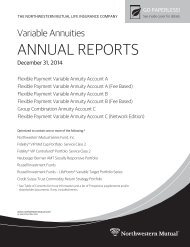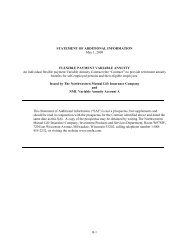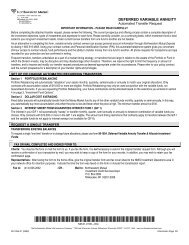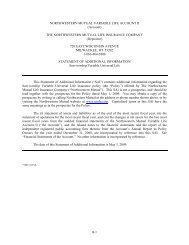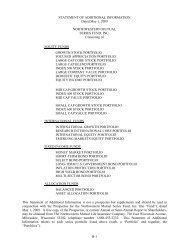B-1 STATEMENT OF ADDITIONAL INFORMATION Dated May 1 ...
B-1 STATEMENT OF ADDITIONAL INFORMATION Dated May 1 ...
B-1 STATEMENT OF ADDITIONAL INFORMATION Dated May 1 ...
You also want an ePaper? Increase the reach of your titles
YUMPU automatically turns print PDFs into web optimized ePapers that Google loves.
shareholders and the effect on shareholder rights. We generally support shareholder proposals that call forthe separation of the Chairman and CEO positions unless there are sufficient governance safeguardsalready in place. With respect to proposals for the approval of a company’s auditor, we oppose auditorswho have a significant non-audit relationship with the company.Executive Compensation Issues – T. Rowe Price’s goal is to assure that a company’s equity-basedcompensation plan is aligned with shareholders’ long-term interests. While we evaluate plans on a caseby-casebasis, T. Rowe Price generally opposes compensation packages that provide what we view asexcessive awards to a few senior executives or that contain excessively dilutive stock option grants basedon a number of criteria such as the costs associated with the plan, plan features, burn rates which areexcessive in relation to the company’s peers, dilution to shareholders and comparability to plans in thecompany’s peer group. We generally oppose efforts to reprice options in the event of a decline in valueof the underlying stock unless such plans appropriately balance shareholder and employee interests, andthe retention of key personnel has become a genuine risk to the company’s business. For companies withparticularly egregious pay practices such as excessive severance packages, perks, and bonuses (despiteunder-performance), or moving performance targets (to avoid poor payouts), we may vote againstcompensation committee members. Finally, we vote for proposals (either management or shareholdersponsored)calling for shareholder ratification of a company’s executive compensation practices (“Sayon-Pay”proposals) a majority of the time.Mergers and Acquisitions – T. Rowe Price considers takeover offers, mergers, and otherextraordinary corporate transactions on a case-by-case basis to determine if they are beneficial toshareholders’ current and future earnings stream and to ensure that our Price Funds and clients arereceiving fair compensation in exchange for their investment.Social and Corporate Responsibility Issues – Vote recommendations for corporate responsibilityissues are generated by the Global Corporate Governance Analyst using RMG’s proxy research. T. RowePrice generally votes with a company’s management on social, environmental and corporateresponsibility issues unless the issue has substantial investment implications for the company’s businessor operations which have not been adequately addressed by management. T. Rowe Price supports welltargetedshareholder proposals on environmental and other public policy issues that are particularlyrelevant to a company’s businesses.Global Portfolio Companies – RMG applies a two-tier approach to determining and applyingglobal proxy voting policies. The first tier establishes baseline policy guidelines for the mostfundamental issues, which span the corporate governance spectrum without regard to a company’sdomicile. The second tier takes into account various idiosyncrasies of different countries, makingallowances for standard market practices, as long as they do not violate the fundamental goals of goodcorporate governance. The goal is to enhance shareholder value through effective use of the shareholderfranchise, recognizing that application of policies developed for U.S. corporate governance issues are notnecessarily appropriate for all markets. The Proxy Committee has reviewed RMG’s general globalpolicies and has developed international proxy voting guidelines which in most instances are consistentwith RMG recommendations.Votes Against Company Management – Where RMG recommends a vote against management onany particular proxy issue, the Proxy Administrator ensures that the portfolio manager reviews suchrecommendations before a vote is cast. Consequently, if a portfolio manager believes that management’sview on a particular proxy proposal may adversely affect the investment merits of owning stock in aparticular company, he/she votes contrary to management. Also, our research analysts present their votingrecommendations in such situations to our portfolio managers.Index and Passively Managed Accounts – Proxy voting for index and other passively-managedportfolios is administered by the Proxy Services Group using T. Rowe Price’s policies as set by the ProxyCommittee. If a portfolio company is held in both an actively managed account and an index account, theindex account will default to the vote as determined by the actively managed proxy voting process.B-128



